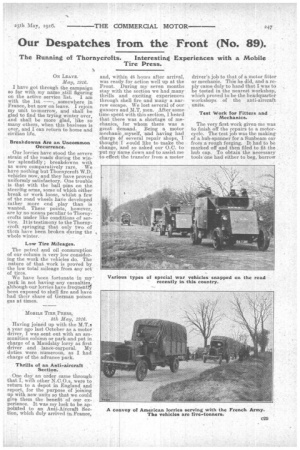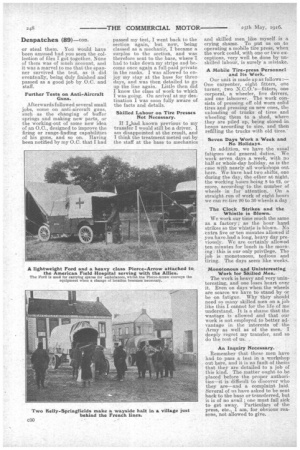Our Despatches from the Front (No. 89).
Page 5

Page 6

If you've noticed an error in this article please click here to report it so we can fix it.
The Running of Thornycrofts. Interesting Experiences with a Mobile Tire Press.
ON LEAVE.
May, 1916.
I have got through the campaign so far with my name :still figuring on the active service list. I am with the 1st —, somewhere in France, but now on leave. I rejoin my unit to-morrow, and shall be glad to find the trying winter over, and shall be more glad, like so many others, when this business is• over, and I'can return to home and civilian life.
Breakdowns Are an Uncommon Occurrence.
Our lorries have stood the severe strain of the roads during the winter splendidly ; breakdowns with us were comparatively rare. We have nothing but Thornycroft W.D.. vehicles now, and they have proved uniformly satisfactory. One trouble is that with the ball Dins .1)11 tho steering arms, some of which either break or work loose, whilst a few of the road wheels have developed rather more end play than is wanted. These points, however, are by no means peculiar to Thorny_ crofts under like conditions of service. It is testimony to the Thornycroft springing that only two of them have been broken during the , whole winter.
Low Tire Mileages.
The petrol and oil consumption of our column is very low considering the work the vehicles do. The nature of that work is proved by the low total mileage from any set' of tires.
We have been fortunate in my park in not having any casualties, although our lorries have frequentlf been exposed to shell fire and have had their share of German poison gas at times.
MOBILE TIRE,PRESS, 8th May, 1916.
Having joinid up with the M.T.s a year ago last October as a motor driver, I was sent out with an ammunition column or park and put in charge of a Maudslay lorry as first driver and lance-corporal. My duties were numerous, as I had charge of the advance park.
Thrills of an Anti-aircraft Section.
One day an order came through that I, with other N.C.O.s, were to return to a depot in England and report, for the purpose . of joining up with new units so that we could give them the benefit of our experience. It was my luck to be appointed to an Anti-Aircraft Section, which duly arrived in France,
and, within 45 hours after arrival, was ready for action well up at the Front. During my seven months stay with the section we had many thrills and exciting experiences through shell fire and many a narrow escape. We lost several of our gunners and M.T. men. After some time spent with this section, I heard that there was a shortage of mechanics, for whom there was a great demand. Being a motor mechanic ,myself, aisd having had charge of several repair shops, I thought I would like to make the change, and so asked our 0.0. to "put my name down and to assist me to effect the transfer from a motor
driver's job to that of a motor fitter or mechanic. This he did, and a reply came duly to hand that I was to be tested in the nearest workshop, which proved to be the headquarter workshops of the anti-aircraft units.
Test Work for Fitters and Mechanics.
The very first work given me was to finish off the repairs to a motorcycle. The test job was the makingof a hub-spanner for a Sunbeam car from a rough forging. It had to be marked off and then filed to fit the hub cap. To obtain the necessary tools one had either to beg, borrow or steal them. You Would haw been amused had you seen the collection of files I got together. None of them was of much account, and it was a marvel to me that the spanner survived the test, as it did eventually, being duly finished and passed as a good job by 0.0. and staff.
Further Tests on Anti-Aircraft Guns.
Afterwards followed several small jobs, some on anti-aircraft guns, such as the changing of buffer springs and making new parts or the working-out of some new idea of an 0.0., designed to improve the firing or range-finding capabilities of his guns, and so on Having been notified by my 0.0. that I had
passed ray test,. I went back to the section again, but now, being classed as a mechanic, I became a surplus to the section, and was therefore sent to the .base, where I had to take down my stripe and become once again a full-paid private in the ranks. I was allowed to enjoy My stay at the base for three days, and was then detailed to go up the line again. Little then did know the class of work to which I.was going. On arrival at my destination I was soon fully aware of the facts and details.
Skilled Labour on Tire Presses Not Necessary.
If Lhad known previous to my transfer I would still be a driver. I am disappointed at the result, and I think the treatment meted out by the staff at the base to mechanics
and skilled men like myself is a crying shame. To put us on to operating a mobile tire press, when the work could, with one or two exceptions, very well be done by unskilled labour, is surely 'a mistake.
A Mobile Tire-press Personnel and Its Work.
Our unit is made up as follows :One carpenter, eight fitters, one turner, two N.C.O.'s—fitters, one corporal, a wheeler, five drivers, and one labourer. The work consists of pressing off old worn solid tires and pressing on new ones, the unloading of trucks of tires and wheeling them to a shed, where they are piled up, being stored in heaps according to size, and then refilling the trucks with old tires.'
Seven Days Work a Week and No Holidays.
In addition, we have the usual fatigues and general duties. We work seven days a week, with no half or whole-day holiday. as is the case with nearly, all wor)eshops out here. We have had two shifts, one during the day, the other at night, the working hours being 8 to 12, or more, according to the number of wheels in for attention. On a straight run of work of eight hours• we can re-tire 20 to 30 wheels a day The Clock Strikes and the Whistle is Blown.
We work our time much the same as a factory ; as the hour hand strikes so the whistle is blown. No extra five or ten minutes allowed if you have .had a long, heavy day previously. We are certainly allowed ten minutes for lunch in the morning : this is our only privilege. The job is monotonous, tedious and tiring. The -clays seem like weeks.
"Monotonous and Uninteresting Work for Skilled Men. The work is heavy and very uninteresting, and one loses heart over it. Evert on days when the wheels are scarce we have to stand by or be on fatigue. Why they should need so many skilled men on a job like this I cannot for the life of me understand. It is a shame that the wastage is allowed and that our work is not employed to better advantage in the interests of the Army as well as of the men. I deeply regret my transfer, and so do the rest of us. ,
An Inquiry Necessary.
Remember that these men have had to pass a test in a workshop out here, and it is no fault of theirs that they are detailed to a job of this kind. The matter ought to be placed before the proper authorities—it is difficult to discover who they are—and a complaint laid. Several of us have asked to be sent back to the base or transf erred, but it is of no avail ; one must fall sick to get away. Particulars of the press, etc. I am, for obvious reasons, not allowed to give.




















